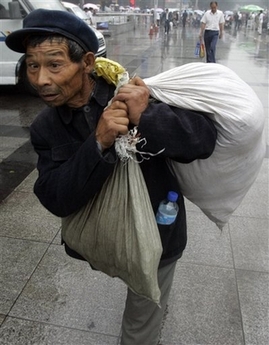C. China train station hub for forced labor
(Agencies/chinadaily.com.cn)Updated: 2007-06-20 09:20
ZHENGZHOU, China - Few police are seen at bustling Zhengzhou train station in central China, where people traffickers are believed to have abducted young boys and others for use as slave laborers at brick kilns.
 A Chinese migrant worker walks past Zhengzhou train station in Zhengzhou, central China's Henan province, Tuesday, June 19, 2007. [AP]  |
There is no shortage of tough-looking men approaching passengers with offers of work and accommodation, offers that frequently turn out to be a ruse to entrap people into forced labor.
Uneducated and grindingly poor, China's 200 million migrant workers are among the most vulnerable to exploitation by phony job offers, and they are easily picked out by the animal feed or fertilizer bags they carry as improvised luggage.
The throbbing, chaotic Zhengzhou station and others like it in north-central China have emerged as links in the slavery scandal that erupted last week, dominating news reports and prompting President Hu Jintao to personally order an investigation.
"China's leaders have paid a lot of attention to this," Foreign Ministry spokesman Qin Gang told reporters at a briefing Tuesday.
Chinese media said the 568 slaves freed in raids last week worked at kilns in Shanxi and Henan provinces that were operating under the protection of corrupt local officials.
Authorities say 168 people have been arrested, but experts say the true scale of forced labor could run much deeper.
"The kiln situation is the tip of the iceberg," said June Teufel Dreyer, a China specialist at the University of Miami. "The problem for Beijing is finding out how large the submerged part is relative to the tip that shows, and how to deal with it."
The raids seemed prompted in part by the public stir over an open letter on the Internet from fathers of missing children. They said officials in both provinces turned a cold shoulder to their claims that up to 1,000 boys were enslaved at the kilns.
In discussions in online forums, official media and the academic community, large numbers of people say the slave kilns underscore the corrosion of good government and public morality in China.
"This issue is about much more than illegal work practices," the Guangzhou Daily said in an editorial. "We see more bloody crimes through it, like kidnapping, abducting, beating, abusing, or even murdering. Behind all of those crimes, there is the misconduct of local officials."
The freed workers had been sold to kilns for $66 each by gangs that lured them with false promises of well-paid jobs or just abducted them from transport hubs or the street.
A number are believed to have died from injury and abuse at the kilns, most of which are in southern Shanxi province, a mountainous region of coal mines and hardscrabble farms along a bend in the Yellow River.
Slaves were forced to work 14 hours or more a day hauling bricks, suffering deep burns and scrapes. When rescued, many were found dazed from exhaustion, hunger and harsh treatment.
Henan farmer Jiao Tusheng fears his son may have been among the gangs' victims, although he has had no word on the 17-year-old's fate.
He said his son, Jiao Pingyang, disappeared in February after leaving their small village of Xitang to go to the bank. After seeing a recent program on Henan Television about the kiln slavery, Jiao and his wife sold their wheat crop and came to Zhengzhou seeking information.
"I know it's a hope, but it's all we have," Jiao, 43, said sobbing. "The Henan and Shanxi police should cooperate more instead of just sitting in their offices."
Jiao's wife has returned home, but he remains on Zhengzhou's outskirts, hoping for word alongside other anxious parents while their money dwindles.
About 470 miles south of Beijing, Zhengzhou's job market is a free-for-all. Walls, billboards and bus shelters around the station are plastered with stickers and hand-lettered signs advertising jobs at shops, hotels and restaurants.
Men offering work roam around the station. Most of the touts waved away attempts to interview them. One man, who wouldn't give his name, said, "I'm here to help people find jobs and places to live."
|
||
|
||
|
|